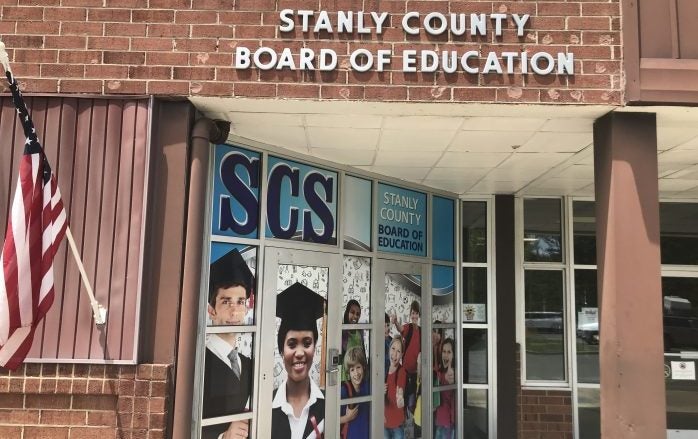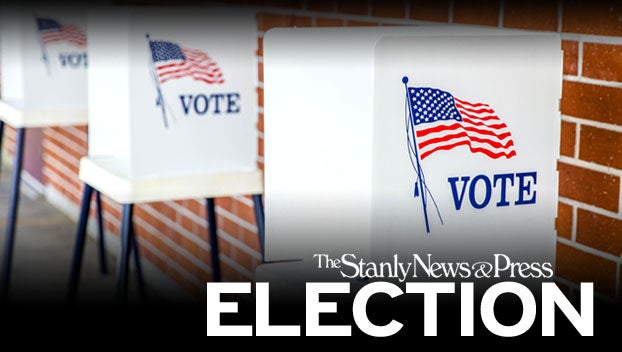SCS will offer summer learning program due to COVID-19
Published 10:46 am Friday, April 23, 2021

- Stanly County Schools is headquartered in Albemarle.
|
Getting your Trinity Audio player ready...
|
Stanly County Schools, along with every school district in the state, will be required to offer a summer learning program to help students deal with learning loss as a result of COVID-19. The State Board of Education approved rules for the new program on Monday.
The idea for a learning recovery and enrichment program originated in the General Assembly with House Bill 82, which was co-sponsored by a host of representatives including Wayne Sasser (R-Stanly).
School districts must offer students at least 150 hours, or 30 days, of summer in-person instruction. The program is prioritized for at-risk students and at risk of failure, but attendance is voluntary and is open to any student, space permitting.
SCS will specifically offer 150 hours of in-person instruction, Monday through Friday from 8 a.m. to 3 p.m. for six weeks, Superintendent Jarrod Dennis said during a joint meeting with the Board of Education and County Commissioners Tuesday evening.
The program is scheduled to run from June 14-July 1 and July 12-29.
Each school district must develop and submit a plan for its specific program within 30 days before the end of school. SCS is drafting a survey that will be sent out to all families Friday in order to gauge which students plan to participate in the program.
Once the district knows how many students want to participate, then it can start to identify which kids are at-risk for academic failure versus students that simply want extra enrichment.
“It’s just a moving target right now,” said Dr. Amy Blake-Lewis, assistant superintendent for curriculum and instruction. “We’re not really sure at this point until that survey goes out and we start getting feedback from parents.”
Charter schools aren’t required to offer the summer program but they are encouraged to submit plans to the state. Charter school students can request a seat in the summer program of the school district they live in.
The summer learning programs are slated to run each year through 2024, Blake-Lewis said, with each one costing the school system about $500,000.
In order to help pay for the summer reading program, school districts have received funding through the Elementary and Secondary School Emergency Relief Fund (ESSER Fund), which is part of the CARES Act. SCS is set to receive $6.7 million through ESSER II funding, which runs through September 2023, and $15.9 million through ESSER III funding, which runs through September 2024.
Roughly $1.7 million in ESSER I funding which was received last year has already been exhausted.
About the New K-12 Summer Program
The program will be open to students of all grade levels.
The 150 hours of instructional time will not include time for lunch and breakfast service, transition periods between classes, and the required daily physical activity period.
Students in kindergarten through second grade will get instruction in reading and math. Students in third through eighth grade will get instruction in reading, math and science.
K-8 students are also required to get a period of physical activity and at least one enrichment activity, such as sports, music and arts (possibly even swim lessons at the Stanly YMCA).
High school students will get in-person instruction in end-of-course subjects and an elective course. They will get access to online course to help them pass courses they failed during the regular school year.
“We don’t expect it to be huge at the 9-12 level, but we do expect it to be pretty big, if the students who need to come do come, at the K-8 level,” Dennis said.
SCS will have to provide transportation and time will be built into each instructional day for teachers to provide individual or small group instruction for at-risk students.
While kindergarten students cannot be retained it they attend the summer program, each school’s principal will reassess the other students who were retained for the 2021-2022 school year to see if they can be promoted upon completion of the program.
School districts have until Oct. 15 to report to the N.C. Department of Public Instruction the results of the competency-based assessment given to K-8 students at the beginning and conclusion of the program, along with the number of students who progressed to the next grade level after participating in the program and the number of students who were retained in the same grade level.
Finding enough teachers
One of the key issues for the summer program, Dennis said, will be recruiting enough teachers to work each day with the students. He noted many SCS teachers are already stressed and tired as a result of all the obstacles over the past year.
Blake-Lewis said many teachers, in preliminary conversations, have already said they are tired and would like to have their summer off “so we know that staffing is a concern. It’s a challenge that we’re going to be up against in looking at this summer program.”
SCS will offer temporary employment contracts, so the teachers will be employed on an hourly basis, though it will not go toward their retirement, Dennis said. Teachers who have been retired for at least one month can also be temporarily employed.
“It’s almost like I’m contracting the teachers for work,” he said.
Teachers and other school personnel will not be eligible to accrue paid leave during their temporary employment.
Teachers will be paid extra to work in the summer program. Some teachers are eligible for a $1,200 signing bonus if they have National Board Certification or in the past received a state bonus based on their students’ reading or math test scores.
There will also be a $150 bonus for third grade teachers for each student that improves from proficient to proficient in reading over the course of the six weeks. Students will take pre- and-post- assessments on iReady to determine if they met growth.
Dennis mentioned he’s open to other options, including hiring teacher assistants and teachers who live in Stanly but work in nearby school districts. Another idea the district has looked into is live instruction from certified teachers through online programs like Edmentum and Educere.
“I’ll take any teachers working right now,” he said.





